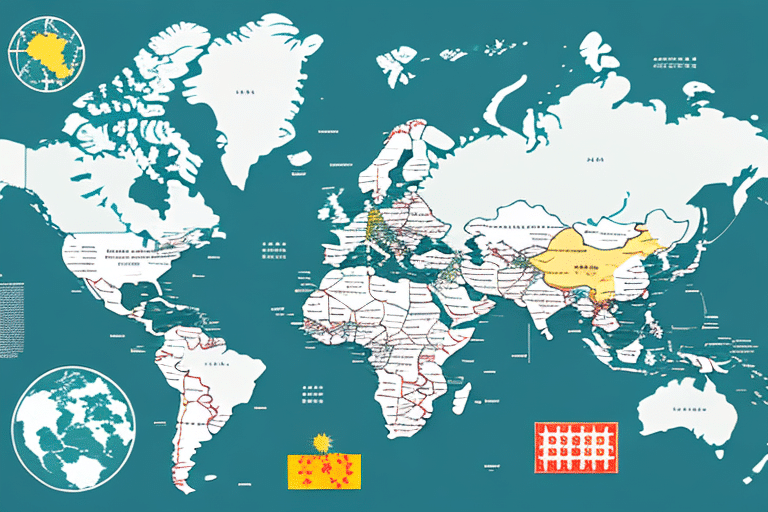Understanding the Chinese Addressing System
Shipping packages to China requires a clear understanding of its unique addressing system. Unlike Western formats, Chinese addresses follow a hierarchical structure that starts with broader geographic areas and narrows down to specific locations. This ensures efficient sorting and delivery within the vast and densely populated regions of China.
- Recipient's Name
- Building Name and Number
- Street Name and Number
- District
- City
- Province
- Country
For more detailed information, refer to the China Post.
The Importance of Accurate Addressing in International Shipping
Accurate addressing is critical in international shipping to prevent delays, additional costs, and returned packages. Inaccurate addresses can lead to:
- Delivery delays or misrouting
- Additional customs inspections and fees
- Increased shipping costs due to corrections
- Potential loss of goods
Statistics from the UPS International Trace indicate that proper addressing can reduce delivery times by up to 20%.
Writing Chinese Addresses in UPS Worldship
UPS Worldship provides tools to simplify the process of writing Chinese addresses. Follow these steps to ensure your package is correctly addressed:
- Enter the recipient’s name in the designated field.
- Input the building name and number accurately.
- Follow the correct order: street address, district, city, province, and postal code.
- Include the recipient’s phone number for verification purposes.
For a comprehensive guide, visit the UPS Worldship Support.
Common Mistakes and How to Avoid Them
When addressing packages to China, avoid these common errors:
- Outdated Information: Ensure all address details, including postal codes and city names, are current.
- Incorrect Hierarchy: Follow the correct order of address components to prevent misrouting.
- Language Errors: Use accurate Chinese characters or reliable translation tools to avoid misunderstandings.
Refer to the China Translation Address Formatting Guide for more insights.
Utilizing Pinyin and Chinese Characters
Pinyin, the Romanization of Chinese characters, aids in pronunciation but should not replace Chinese characters in addressing. While Pinyin can be useful for initial translations, always include the original Chinese characters to ensure clarity and recognition by local postal services.
- Use Pinyin as a supplement, not a substitute.
- Ensure Chinese characters are accurately represented to avoid delivery issues.
Learn more about Pinyin usage in addresses from the Pinyin Information Center.
Translating English Addresses to Chinese
If you only have an English address, use reliable translation tools and verification methods to convert it to Chinese characters:
- Utilize trusted translation software like Google Translate.
- Have a native Chinese speaker review the translated address for accuracy.
- Understand the structural differences between English and Chinese addresses to maintain proper formatting.
For professional assistance, consider consulting with translation services such as TranslatorsCafe.
Best Practices for Shipping to China with UPS Worldship
To ensure smooth delivery when shipping to China using UPS Worldship, adhere to these best practices:
- Include Contact Information: Always list the recipient’s phone number to facilitate communication with customs officials.
- Detailed Labeling: Provide the full name, company name, and job title if applicable to ensure precise delivery.
- Use Verified Addresses: Utilize UPS Worldship’s address validation tools to confirm accuracy before shipping.
- Comply with Regulations: Familiarize yourself with Chinese customs regulations to avoid prohibited items and ensure proper documentation.
For detailed shipping guidelines, visit the UPS International Shipping Information.
Verifying Chinese Addresses in UPS Worldship
Ensuring the accuracy of Chinese addresses can significantly impact delivery success. Use UPS Worldship’s "Address Validation" feature to verify addresses:
- Enter the address into the UPS Worldship validation tool.
- Review the standardized address format provided by the tool.
- Make necessary adjustments based on the validation results to ensure correctness.
For more information on address validation, refer to the UPS Address Validation Guide.
Staying Updated with Changes in the Chinese Addressing System
The Chinese addressing system is dynamic, with frequent updates to cities, districts, and postal codes. To maintain accurate shipping information:
- Regularly consult official sources like China Post for the latest address updates.
- Subscribe to UPS notifications for changes in international addressing standards.
- Utilize address verification tools periodically to ensure ongoing accuracy.
Staying informed helps prevent disruptions in your international shipping operations.
Conclusion
Writing accurate Chinese addresses in UPS Worldship is essential for successful international shipping. By understanding the Chinese addressing system, utilizing proper tools, and following best practices, you can ensure your packages reach their intended recipients efficiently and reliably. Regularly update your knowledge and use authoritative resources to maintain accuracy in your shipping operations.






















